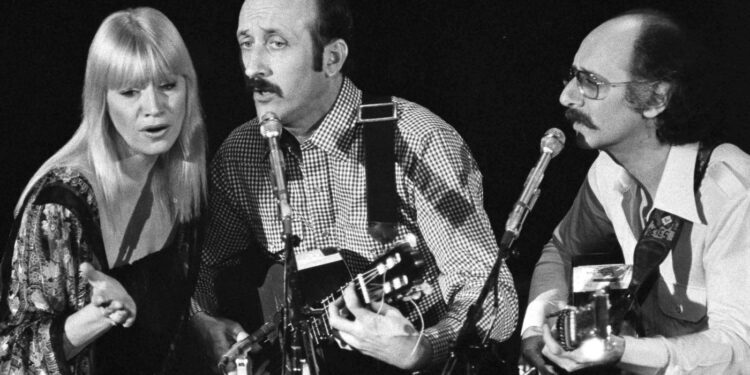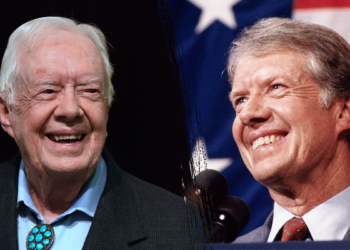
LOS ANGELES — Peter Yarrow, the singer-songwriter best known as one-third of Peter, Paul and Mary, the folk-music trio whose impassioned harmonies transfixed millions as they lifted their voices in favor of civil rights and against war, has died. He was 86.
Yarrow, who also co-wrote the group’s most enduring song, “Puff the Magic Dragon,” died Tuesday in New York, publicist Ken Sunshine said. Yarrow had bladder cancer for the past four years.
“Our fearless dragon is tired and has entered the last chapter of his magnificent life. The world knows Peter Yarrow the iconic folk activist, but the human being behind the legend is every bit as generous, creative, passionate, playful, and wise as his lyrics suggest,” his daughter Bethany said in a statement.
During an incredible run of success spanning the 1960s, Yarrow, Noel Paul Stookey and Mary Travers released six Billboard Top 10 singles, two No. 1 albums and won five Grammys.
They also brought early exposure to Bob Dylan by turning two of his songs, “Don’t Think Twice, It’s All Right” and “Blowin’ in the Wind,” into Billboard Top 10 hits as they helped lead an American renaissance in folk music. They performed “Blowin’ in the Wind” at the 1963 March on Washington at which the Rev. Martin Luther King Jr. delivered his famous “I Have a Dream” speech.
After an eight-year hiatus to pursue solo careers, the trio reunited in 1978 for a “Survival Sunday,” an anti-nuclear-power concert that Yarrow had organized in Los Angeles. They would remain together until Travers’ death in 2009. Upon her passing, Yarrow and Stookey continued to perform both separately and together.
Born May 31, 1938, in New York, Yarrow was raised in an upper middle class family he said placed high value on art and scholarship. He took violin lessons as a child, later switching to guitar as he came to embrace the work of such folk-music icons as Woody Guthrie and Pete Seeger.
Upon graduating from Cornell University in 1959, he returned to New York, where he worked as a struggling Greenwich Village musician until connecting with Stookey and Travers. Although his degree was in psychology, he had found his true calling in folk music at Cornell when he worked as a teaching assistant for a class in American folklore his senior year.
“I did it for the money because I wanted to wash dishes less and play guitar more,” he told the late record company executive Joe Smith. But as he led the class in song, he began to discover the emotional impact music could have on an audience.
“I saw these young people at Cornell who were basically very conservative in their backgrounds opening their hearts up and singing with an emotionality and a concern through this vehicle called folk music,” he said. “It gave me a clue that the world was on its way to a certain kind of movement, and that folk music might play a part in it and that I might play a part in folk music.”
Soon after returning to New York, he met impresario Albert Grossman, who would go on to manage Dylan, Janis Joplin and others and who at the time was looking to put together a group that would rival the Kingston Trio, which in 1958 had a hit version of the traditional folk ballad “Tom Dooley.”
But Grossman wanted a trio with a female singer and a member who could be funny enough to keep an audience engaged with comic patter. For the latter, Yarrow suggested a guitar-strumming Greenwich Village comic he’d seen named Noel Stookey.
Stookey, who would use his middle name as a member of the group, happened to be a friend of Travers, who as a teenager had performed and recorded with Pete Seeger and others. Gripped by stage fright, she was reluctant to join the pair at first, changing her mind after she heard how well her contralto voice melded with Yarrow’s tenor and Stookey’s baritone.
“We called Noel up. He was there,” Yarrow said, recalling the first time the three performed together. “We mentioned a bunch of folk songs, which he didn’t know because he didn’t have a real folk-music background, and wound up singing ‘Mary Had a Little Lamb.’ And it was immediately great, was just as clear as a bell, and we started working.”
After months of rehearsal the three became an overnight sensation when their first album, 1962’s eponymous “Peter, Paul and Mary,” reached No. 1 on the Billboard chart. Their second, “In the Wind,” reached No. 4 and their third, “Moving,” put them back at No. 1.
From their earliest albums, the trio sang out against war and injustice in songs like Seeger’s “If I Had a Hammer” and “Where Have all the Flowers Gone,” Dylan’s “Blowin’ in the Wind” and “When the Ship Comes In” and Yarrow’s own “Day is Done.”
They could also show a soft and poignant side, particularly on “Puff the Magic Dragon,” which Yarrow had written during his Cornell years with college friend Leonard Lipton.
In addition to daughter Bethany, he is survived by his wife, Marybeth, son Christopher, and granddaughter Valentina.
Originally Published:







